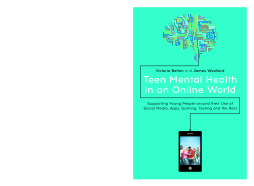
Additional Information
Book Details
Abstract
This essential book shows practitioners how they can engage with teens' online lives to support their mental health. Drawing on interviews with young people it discusses how adults can have open and inquiring conversations with teens about both the positive and negative aspects of their use of online spaces.
For most young people there is no longer a barrier between their 'real' and 'online' lives. This book reviews the latest research around this topic to investigate how those working with teenagers can use their insights into digital technologies to promote wellbeing in young people. It draws extensively on interviews with young people aged 12-16 throughout, who share their views about social media and reveal their online habits. Chapters delve into how teens harness online spaces such as YouTube, Instagram and gaming platforms for creative expression and participation in public life to improve their mental health and wellbeing. It also provides a framework for practitioners to start conversations with teens to help them develop resilience in respect of their internet use. The book also explores key risks such as bullying and online hate, social currency and the quest for 'likes', sexting, and online addiction.
This is essential reading for teachers, school counsellors, social workers, and CAMHS professionals (from psychiatrists to mental health nurses) - in short, any practitioner working with teenagers around mental health.
Table of Contents
| Section Title | Page | Action | Price |
|---|---|---|---|
| Teen Mental Health in an Online World: Supporting Young People around their Use of Social Media, Apps, Gaming, Texting and the Rest by Victoria Betton and James Woollard | 2 | ||
| Acknowledgements | 7 | ||
| A note about terminology | 9 | ||
| 1. Introduction | 11 | ||
| 2. Social media, digital technologies and the internet: Introducing teens’ connected realities | 23 | ||
| 3. Getting creative: The affordances of digital for good mental health | 55 | ||
| 4. Developmental frameworks and perspectives | 83 | ||
| 5. From digital natives to digital differences | 109 | ||
| 6. Understanding adverse experiences online | 127 | ||
| 7. Digital resilience and digital rights | 173 | ||
| 8. A three-step framework for supporting teens’ digital resilience | 197 | ||
| 9. Implications of digital technologies for young people’s services | 231 | ||
| Conclusion | 253 | ||
| References | 267 | ||
| Further reading | 279 | ||
| About the authors | 281 | ||
| Index | 283 | ||
| Blank Page |
